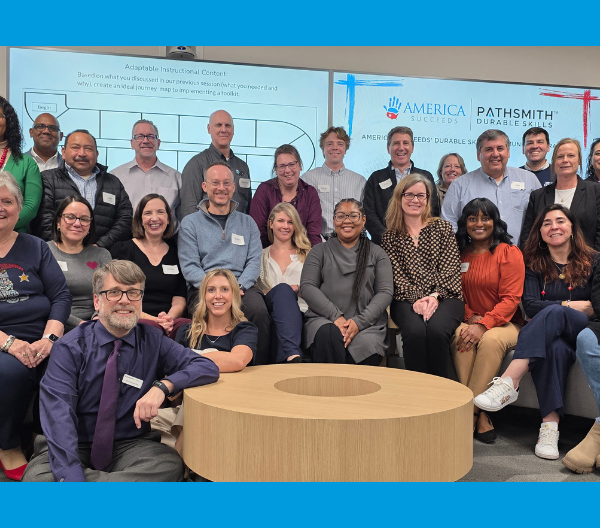In every academic journey, regardless of the destination, Durable Skills are the compass guiding students toward success. That’s why our aim is to ensure that by 2030, 25 million American l/earners have access to top-notch resources that nurture the delivery, development, demonstration, and validation of these crucial skills.
How we impart Durable Skills education matters deeply, making effective and equitable delivery pivotal to our goal. To ensure that Durable Skills development is not only impactful but also sustainable and scalable, we’ve launched a Research Practice Collaborative. Continue reading to learn the ins and outs of the inaugural phase of our research journey.
Meet the Experts Behind the Exploration
At the heart of the Research Practice Collaborative lies a diverse pool of expertise from academia and industry:
- America Succeeds team: Michael Crawford, Ph.D., drives the work as the Project Lead, bringing a wealth of experience from VELA and consulting roles with WGU Labs and the South African Department of Basic Education. Aidan Schief plays a pivotal role in moving the Collaborative forward as the Project and Research Coordinator.
- Lead Advisors: Dr. Chris Unger and Dr. Michael Dean from Northeastern University.
- Other Advisors: A distinguished panel including Dr. Devin Vodicka from Learner-Centered Collaborative, Andrew Calkins from Next Generation Learning Challenges, Dr. David Hansen from the University of Kansas, Dr. Jane Shore from School of Thought, Kwaku Aning from San Diego Jewish Academy, and Dr. Michelle R. Weise from Rise & Design.
Exploring Durable Skills in Education: Phase 1 Insights
Over the next year, our focus will be on studying 15-20 school models embracing Durable Skills development in learner-centered, equitable, rigorous ways. Phase 1, the initial step in our three-phase journey, marks the beginning of our exploration of Durable Skills development in educational settings. Throughout the next 5 months, we will develop and refine instruments that will help us better understand how young people develop Durable Skills.
Setting the Stage: Planning and Coordination
Phase 1 of the RPC began by carrying out planning and logistical coordination to lay the groundwork for our endeavors. Working with our research team, we finalized questions that encapsulate our curiosity about how high schools/programs can support Durable Skills development. Additionally, we conducted a literature review, mining scholarly insights to inform our exploration of programs and ensure that we can recognize approaches to Durable Skills development that are equitable and evidence-based. We then outlined partner expectations and solidified partnerships with four programs, gearing up for on-site activities.
Methodological Rigor: Crafting Tools to Understand Durable Skills
Methodological rigor is taking the center stage in this phase. To understand the kinds of conditions, pedagogical approaches, tools, cultures, etc., that enable the development of Durable Skills in students, we are conducting focus groups, interviews, and surveys with students, educators, and administrators. Through the perspectives and experiences shared by youth and adults, we aim to gain insights into practices that foster Durable Skills development.
Unlocking Insights with Durable Skills Data
Phase 1 will conclude with data analysis, allowing us to understand the nuances of Durable Skills development across diverse educational contexts. What we discover in Phase 1 will inform our subsequent research with an expanded sample of schools and programs. Throughout Phase 1, participants will engage in a Community of Practice to share experiences and strategies for cultivating the development of Durable Skills.
Stay Tuned for Ongoing Collaborative Updates
We extend our heartfelt gratitude to our research team and the participants in the RPC for their invaluable contribution to this transformative movement. As we dive deeper into our research journey, we’re excited to share stories, findings, and lessons along the way. Stay tuned for an upcoming blog introducing the programs participating in Phase 1.




